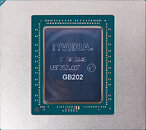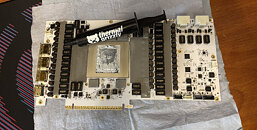
Bootleg GeForce "RTX 5090 32G D7 Turbo" Cards with Blower-style Coolers Spotted on Goofish
Around mid-April, an unusual custom GeForce RTX 5090D design received international news coverage. Under normal circumstances, NVIDIA's board partners have not equipped modern gaming graphics cards with blower-style cooling solutions—typically, this type of treatment is reserved for workstation-grade products (operating at lower TDPs). Team Green's GB202 "Blackwell" GPU is in high demand, due to its AI-crunching prowess—even in slightly nerfed form. Smaller Chinese AI firms and well-heeled hobbyists seemed to be snapping up sanction-adjusted flagship gaming GPUs that are/were coupled with very unofficial blower-type coolers. A month and a half later, Olrak29 has placed a spotlight on a curious batch of bootleg-esque "RTX 5090 32G D7 Turbo" models. As implied by this identifier, these offerings seem to leverage the unpasteurized GeForce RTX 5090 (non-D) GPU.
Photo evidence was scraped from Goofish; a second-hand trading platform owned and operated by Alibaba. As of last month, industry whispers suggested another downgrade of the Chinese market-exclusive GeForce RTX 5090D design—following the complete cutoff of GB202 die shipments into the region. Given current global tensions and export restrictions, NVIDIA and Leadtek's Blackwell PRO W card series faces an uncertain future in China. The Goofish photo uploads indicate an impressive volume of unbranded "RTX 5090 32G D7 Turbo" stock. Stacks of boxes in the background are labelled with "NVIDIA RTX 4090 24G AIB BLOWER" or "NVIDIA RTX 4070 12G AIB BLOWER" stickers—perhaps as diversion tactics. According to VideoCardz and Tom's Hardware, Team Green is not expected to play detective—the North American corporation will probably not provide in-depth comments about elaborate "GPU smuggling" channels.
Photo evidence was scraped from Goofish; a second-hand trading platform owned and operated by Alibaba. As of last month, industry whispers suggested another downgrade of the Chinese market-exclusive GeForce RTX 5090D design—following the complete cutoff of GB202 die shipments into the region. Given current global tensions and export restrictions, NVIDIA and Leadtek's Blackwell PRO W card series faces an uncertain future in China. The Goofish photo uploads indicate an impressive volume of unbranded "RTX 5090 32G D7 Turbo" stock. Stacks of boxes in the background are labelled with "NVIDIA RTX 4090 24G AIB BLOWER" or "NVIDIA RTX 4070 12G AIB BLOWER" stickers—perhaps as diversion tactics. According to VideoCardz and Tom's Hardware, Team Green is not expected to play detective—the North American corporation will probably not provide in-depth comments about elaborate "GPU smuggling" channels.





















































